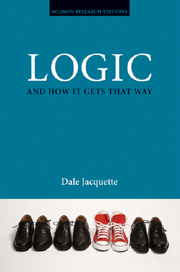Book contents
- Frontmatter
- Contents
- Preface
- Introduction: Logic, philosophy, analysis
- 1 Logical form
- 2 Monkey raisins
- 3 The secret life of truth-functions
- 4 Reference and identity
- 5 Intensional versus extensional logic and semantics
- 6 Truth
- 7 Logical and semantic paradoxes
- Conclusion: Moral lessons of logic
- Notes
- References
- Index
1 - Logical form
- Frontmatter
- Contents
- Preface
- Introduction: Logic, philosophy, analysis
- 1 Logical form
- 2 Monkey raisins
- 3 The secret life of truth-functions
- 4 Reference and identity
- 5 Intensional versus extensional logic and semantics
- 6 Truth
- 7 Logical and semantic paradoxes
- Conclusion: Moral lessons of logic
- Notes
- References
- Index
Summary
CONCEPTS OF LOGIC
If we can explain what logic is, correctly describing in the most general way the nature or concept of logic, then we should have already said enough to understand why logic is important. We may begin, in keeping with customary practice, by saying that logic studies the structural properties of reasoning. Reasoning in turn is an exercise of thought, at least of thoughts considered in the abstract, in which conclusions are drawn inferentially from assumptions.
Assumptions and conclusions, in turn, are propositions. The ontic status of propositions is a frequent subject of philosophical dispute. Propositions can nevertheless be interpreted as sentence tokens or types or the abstract meanings of sentence tokens or types, in which a state of affairs is proposed for consideration, classically as true or false. Logical inference is generally considered to be a syntactical correlation of sentences representing assumptions and conclusions in permissible combinations, or as a semantic relation holding between the possible truth-values of propositions taken respectively as assumptions and conclusions. We may also be able to reason in the sense of drawing inferences from questions and commands, and from direct experiential encounters with the state of the world in the empirical experience of sensation and perception. Logicians have investigated some of these non-propositional formal inferential relations, but the topic has not been widely explored in the philosophical literature.
Information
- Type
- Chapter
- Information
- Logic and How it Gets That Way , pp. 7 - 21Publisher: Acumen PublishingPrint publication year: 2010
